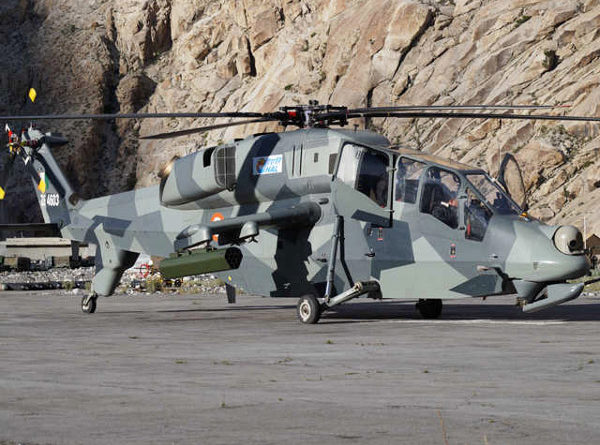India’s Light Combat Helicopter Could Be A Game Changer
29 February, 2020
It will complement the US-made Apache helicopter gunships and give India’s integrated theatre command a large fleet of attack helicopters.
Attack helicopters have been in the news lately. Earlier this week, a government-to-government deal for eight Apache helicopter gunships for the Indian Army was signed during the visit of President Donald Trump. In September 2019, the Indian Air Force (IAF) began taking deliveries of the first batch of their 22 Apaches contracted for under a $1.1 billion deal in 2015.
With the Indian armed forces set to operate 30 of these highly capable machines, it’s easy to lose sight of the indigenous Light Combat Helicopter (LCH) being developed by Hindustan Aeronautics Ltd (HAL). Defence Minister Rajnath Singh on Thursday inaugurated the new LCH production hangar at HAL’s Helicopter Division. HAL officials said the LCH “is completely ready for induction and the complex fully geared up for its production”.
I have been following the LCH’s development and flight testing over the past four years, and in my opinion, it has progressed very well. I was fortunate to fly this mean machine during Aero India 2017. It was a delightful experience. The test pilot demonstrated a fairly wide array of combat/weapon delivery and high-G manoeuvres and later, I flew the entire flight profile myself.
The LCH has evolved into a very sturdy, potent and highly manoeuvrable platform. (Photo: Wikimedia Commons)
I can say with great confidence and pride that the LCH has evolved into a very sturdy, potent and highly manoeuverable platform. I was particularly impressed by the platform stability, ease of handling it in high-G manoeuvres and control responses in the entire flight envelope that we flew. Given the fact that these features form the basic requirements for a combat helicopter for accurate weapon delivery, the LCH meets most attack helicopter requirements and parameters with distinction. The indigenous helicopter could be a valuable stepping stone for our pilots moving on to the Apache.
The armed forces are to set up theatre commands, as recently announced by the Chief of Defence Staff General Bipin Rawat.
Thirty Apaches will be grossly inadequate to perform the close air support missions in these three or four theatres. The planned acquisition of nearly 200 LCHs for the army and air force will bring battlefield support helicopters in the numbers for these new commands.
While the Apaches would do well in the plains, they would have limitations operating in the upper reaches of the Himalayas. During the Kargil War of 1999, there was a need felt for armed attack helicopters capable of operating at high altitude. That’s where the LCH fits in. It has successfully been tested in altitudes over 13,000 feet and was the first attack helicopter to land at the forward landing base in Siachen.
Today, as the LCH heads towards achieving its full operational capability (FOC) standards, especially after successful test firing of almost its entire weapons suite, the only aspects which will have to be dealt with very carefully and intelligently are the aspects of flawless weapons integration and maintainability. HAL needs to focus on robust product support and maintenance of these machines to ensure availability.
If done well, the LCH will be a success story. I say this with some confidence since I have flown many types of helicopters over 40 years, and the LCH to me is evolving as a fine combat helicopter. The LCH can be the game changer in our indigenisation and Make in India pursuit, if flawlessly monitored and progressed. The Ministry of Defence and HAL must not spare any effort to pursue the LCH FOC targets with vigour, so that this ‘lean and mean machine’ evolves into a great combat asset for the Indian Armed Forces and indeed, the nation.
Courtesy: Opera News/ dailyo.in

